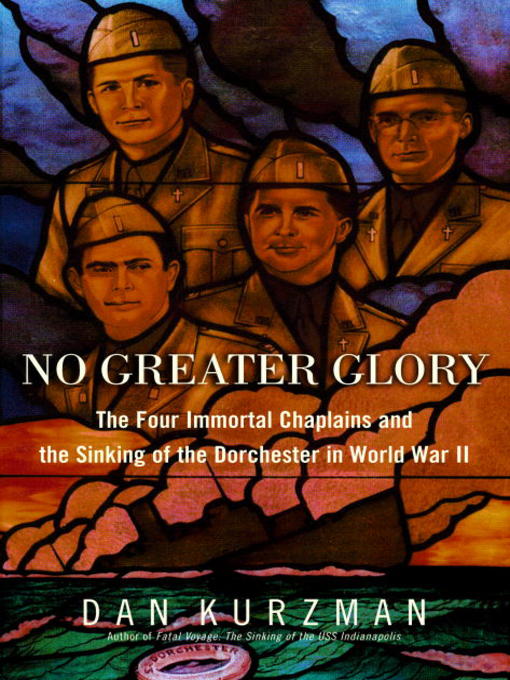
No Greater Glory
The Four Immortal Chaplains and the Sinking of the Dorchester in World War II
کتاب های مرتبط
- اطلاعات
- نقد و بررسی
- دیدگاه کاربران
نقد و بررسی

April 12, 2004
The U.S. Army Transportation Service troopship Dorchester
was torpedoed in the North Atlantic, 100 miles south of Greenland, on the night of February 3, 1943. As a former luxury liner, the ship went down quickly. Of the 900 passengers and crew, 597 were military personnel, and four of those men were the ship's chaplains—Methodist senior chaplain George Lansing Fox, rabbi Alexander Goode, Dutch Reformed minister Clark V. Poling and John P. Washington, a Roman Catholic priest. Each chaplain distributed life vests as the ship went down and then gave up their own when supply ran out. (There were approximately 200 survivors.) Former Washington Post
correspondent Kurzman (Fatal Voyage
) follows the men from their enlistments to that fateful night, detailing their families and travails along the way. The result is the fullest reckoning yet for the men who have become known as "The Four Immortal Chaplains," who have previously been commemorated by the U.S. Postal Service, with a stamp issued in their honor. Agent, Elaine Markson Literary Agency.

Starred review from April 1, 2004
Many modern conflicts trace their roots to religious fundamentalism and the inflexibility of Christian, Jewish, and Muslim fundamentalists. Formerly a foreign correspondent with the Washington Post, Kurzman (Fatal Voyage: The Sinking of the USS Indianapolis) uses primary and secondary sources to re-create the lives of four military chaplains who refused to let their religious differences stand in the way of their ministry to others. He traces the lives of these four men from their formative childhood years and call to service to their fateful deaths when the troopship SS Dorchester was torpedoed by Germans and sank off Greenland in 1943. These four immortal chaplains-Catholic, Methodist, Dutch Reformed, and Jewish-provided an excellent example of finding common ground and bravely serving one's fellow man as they distributed life jackets to all but themselves. No Greater Glory flows like a novel and reminds the reader that the foundation of most religions is love, not hatred. Well written and suitable for the general public, this work is highly recommended for all libraries.-Lt. Col. Charles M. Minyard (ret.), U.S. Army, Blountstown, FL
Copyright 2004 Library Journal, LLC Used with permission.

March 15, 2004
In the Battle of the Atlantic's catalog of tragedies, the 1943 sinking of an American troop transport stands out as a heroic vignette witnessed by survivors. They recounted how four chaplains, after pressing their life jackets on terrified young men, went down with the ship, praying. The chaplains have been commemorated over the years in various media but never in so comprehensive a fashion as in Kurzman's book. His research of primary documents associated with each chaplain's life and religious career, and interviews of people who knew them, pays off in a narrative that not only recalls the men's personalities but also the quality of their faith in God. It was slightly different for each--an intellectual decision for Protestant minister Clark Poling; a starting point for an idealistic commitment to brotherhood and democracy for the young rabbi Alexander Goode. From the chaplains' bonding in training camp to the voyage to Greenland, their duties and sacrifice are movingly commemorated in this poignant account, which is bound to connect with spiritually minded readers.(Reprinted with permission of Booklist, copyright 2004, American Library Association.)

























دیدگاه کاربران